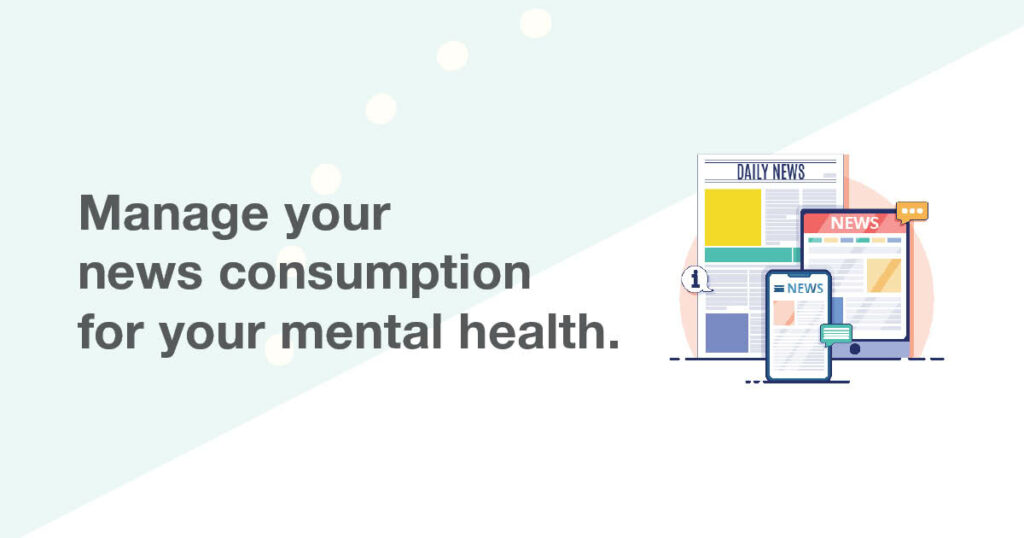Menu
Close

Navigating Mental Well-Being Amid the Middle East Conflict
Oct 18, 2023
The ongoing war in the Middle East has garnered significant attention worldwide.
With real-time updates, graphic images, and a plethora of opinions flooding our screens, it’s easy to feel overwhelmed.
Continuous exposure to such emotionally charged news can take a toll on one’s mental health, raising the crucial question: how can we stay informed without compromising our well-being?
Here are some ways to stay informed and seek help to prioritize mental well-being in a time of global unrest.
Consume News Mindfully
During trying global events, the quality of the information we consume becomes pivotal. Not all news sources offer balanced views. Some might sensationalize events or provide biased perspectives, further fueling anxiety and distress. Selecting reliable news sources becomes a primary step in ensuring we receive a more neutral, comprehensive understanding of events. This, in turn, can help manage the emotional turbulence often associated with disturbing news.
However, even with trusted sources, the sheer volume of continuous updates can be overwhelming. Designating specific intervals during the day to catch up on news can counteract this. By doing so, we create a mental buffer, ensuring we aren’t persistently subjected to distressing information throughout the day. Additionally, disabling notifications, especially those related to the conflict, can alleviate the strain associated with constant news alerts.
In our digitally-driven age, maintaining focus amidst numerous distractions can be challenging. Tools designed to manage and mitigate digital disturbances can be invaluable. Check the settings on your phone to limit screen time or use a tool like The Freedom App to block specific websites and apps known to be major distractors. By earmarking ‘quiet’ digital intervals, one can foster a healthier balance between staying updated and mental rejuvenation.
Seek Support When It Gets Overwhelming
Call or text our 24-hour Crisis Response Phone Line
CMHA Thunder Bay Crisis Response offers a 24/7 mental health phone line for the entire Northwestern Ontario Region. Anyone residing from Kenora east to Wawa can access the regional crisis phone line 24/7. Trained staff are available to respond to calls or texts to listen, provide support and assist in finding solutions and offering resources to all incoming calls with their primary focus on assessment and mitigation of risk. This component of the service gathers information, completes telephone assessments, screens, triages, and provides callers with relevant information, assistance or direction in order to pursue crisis resolution.
Eligibility: All Ages
Hours: 24 hours a day, 7 days per week, 365 days a year
Contact: 807-346-8282 | District/Toll Free: 1-866-888-8988
Local distress centers play a pivotal role during times of global crises.
They offer solace, understanding, and support to individuals wrestling with the emotional ramifications of such events.
These centers are equipped to provide counseling and lend a listening ear, helping individuals navigate and process their feelings.
Find your nearest location here: https://www.dcontario.org/locations/
Call ConnexOntario if You Need Mental Health, Addiction or Gambling Support
Heightened anxieties or behaviours are exacerbated by global tensions.
ConnexOntario offers support for mental health, addiction, and gambling concerns, ensuring that those in need have a reliable place to turn.
Visit https://www.connexontario.ca/ or call 1.866.531.2600 or text 247247 to speak to someone live.
While it’s essential to stay informed, it’s equally crucial to prioritize mental health.
In the ever-evolving landscape of global news, finding a balance between awareness and well-being is key.
Whether it’s by setting boundaries around news consumption, using digital tools, or seeking support, remember that safeguarding mental health is paramount, especially in challenging times.